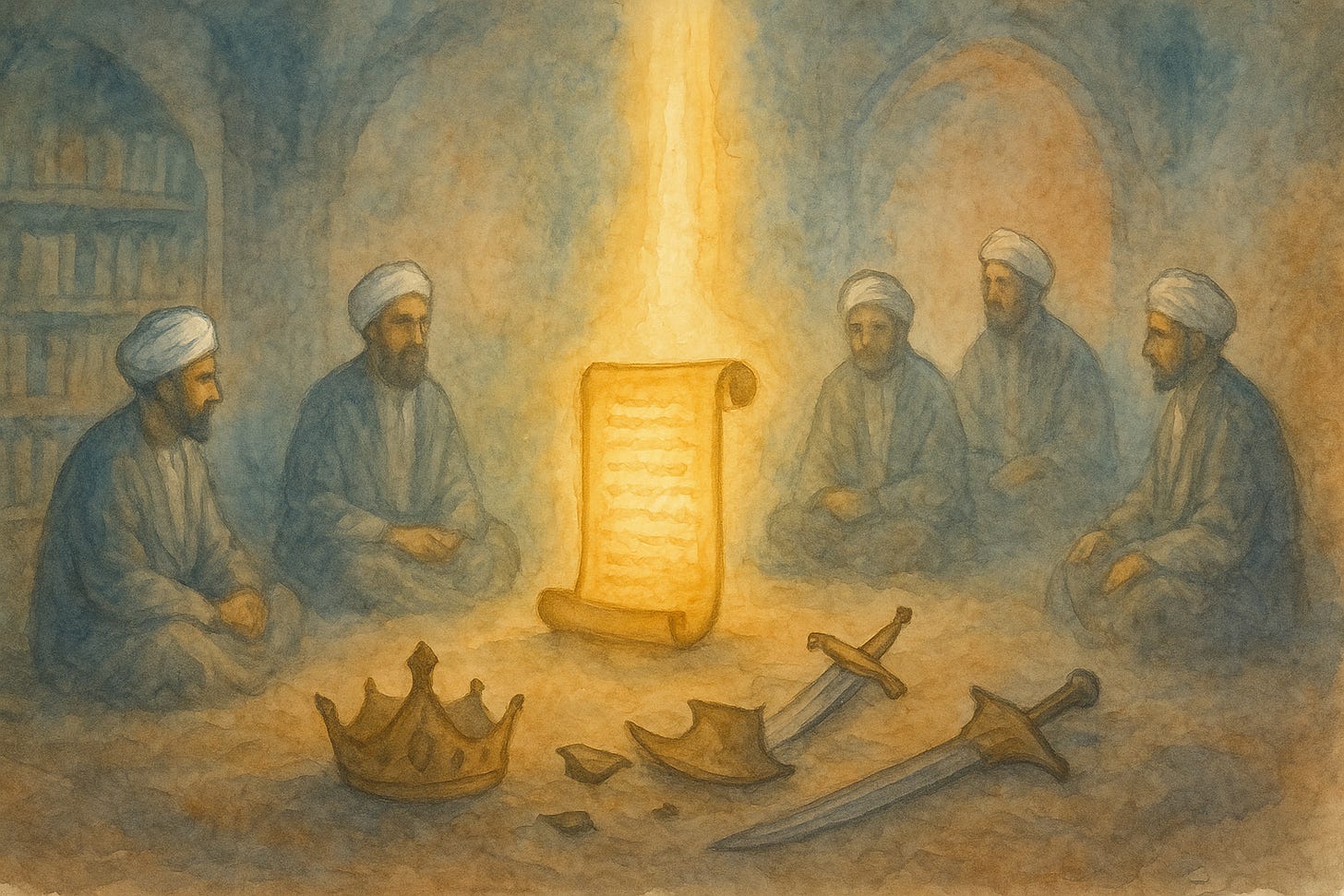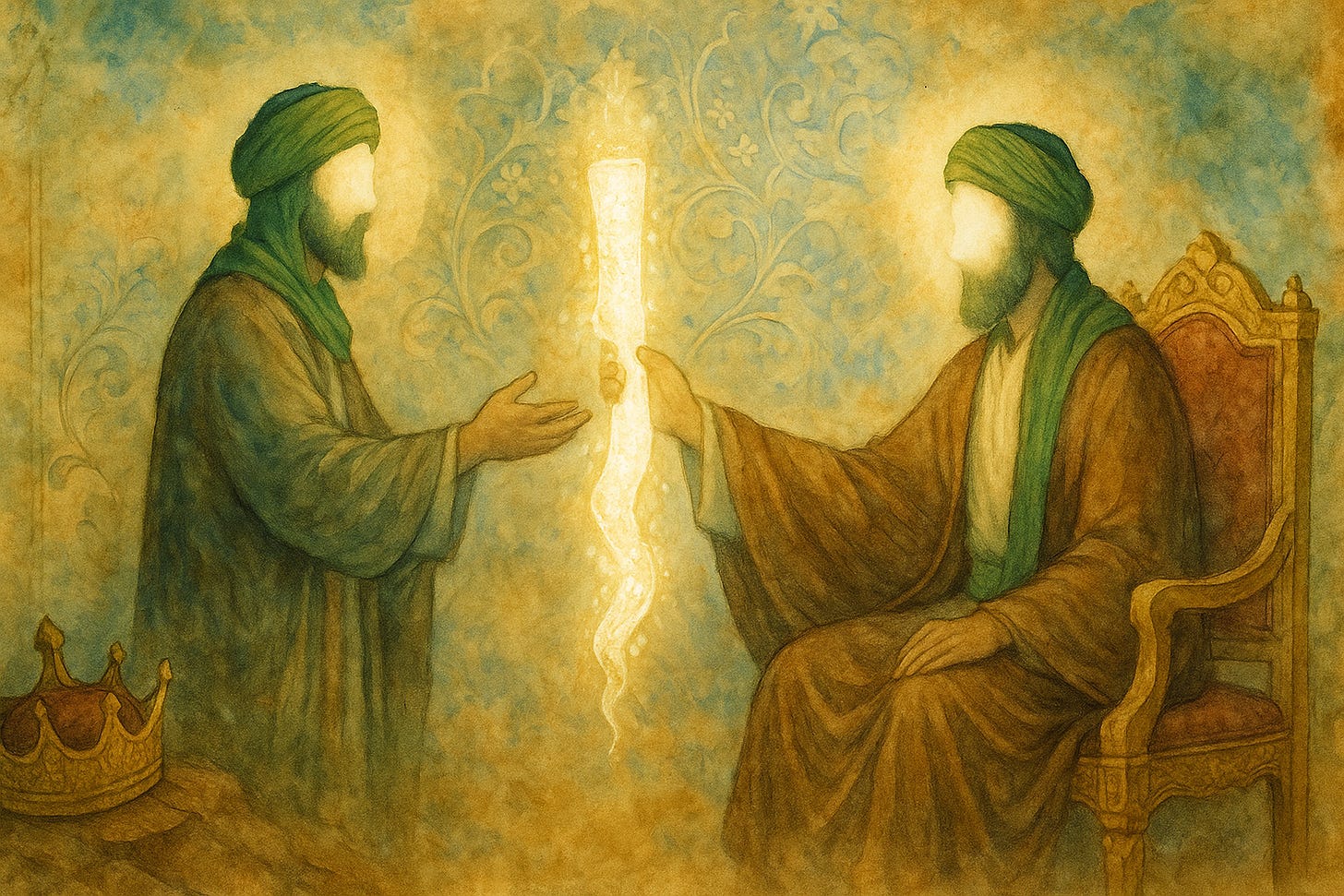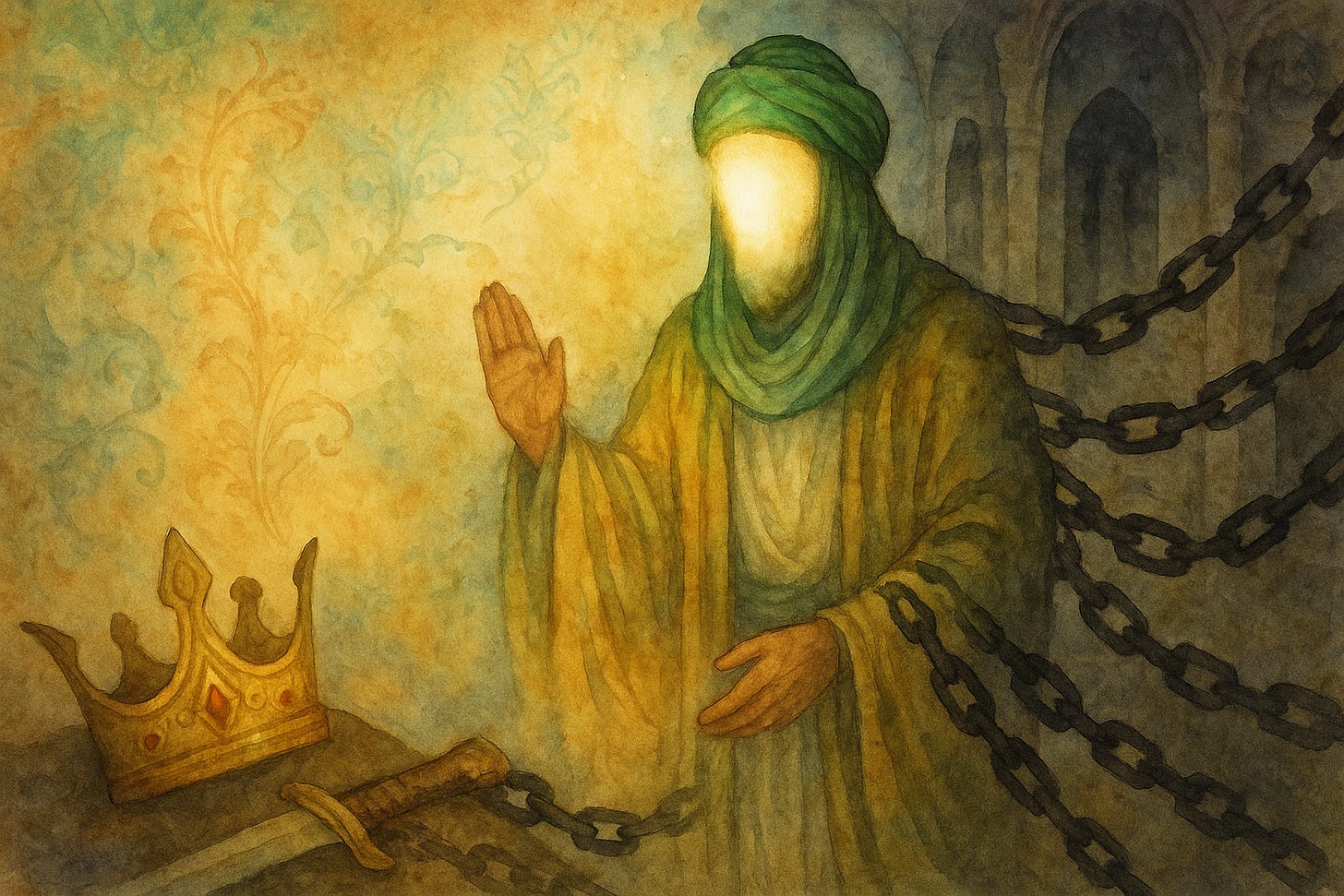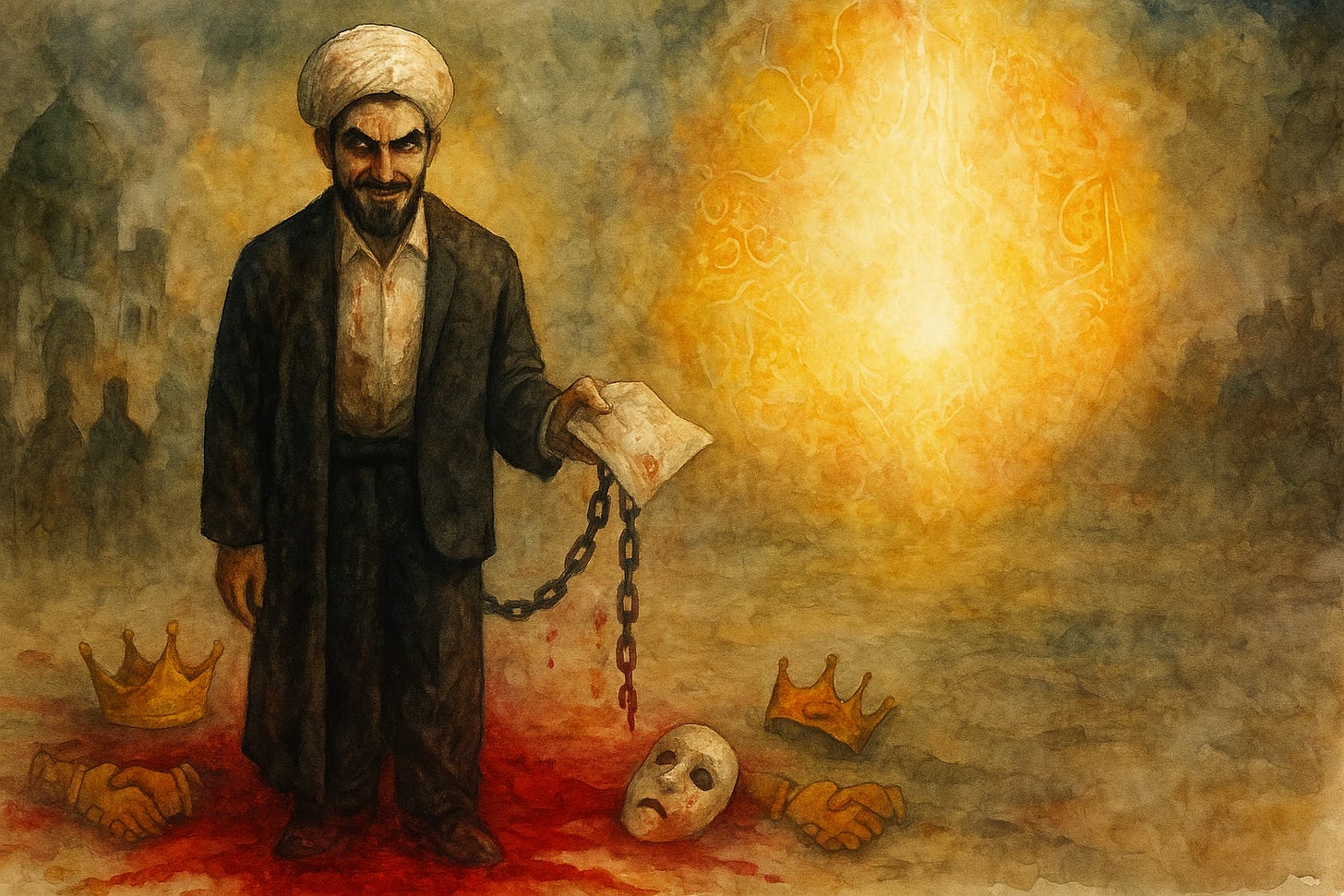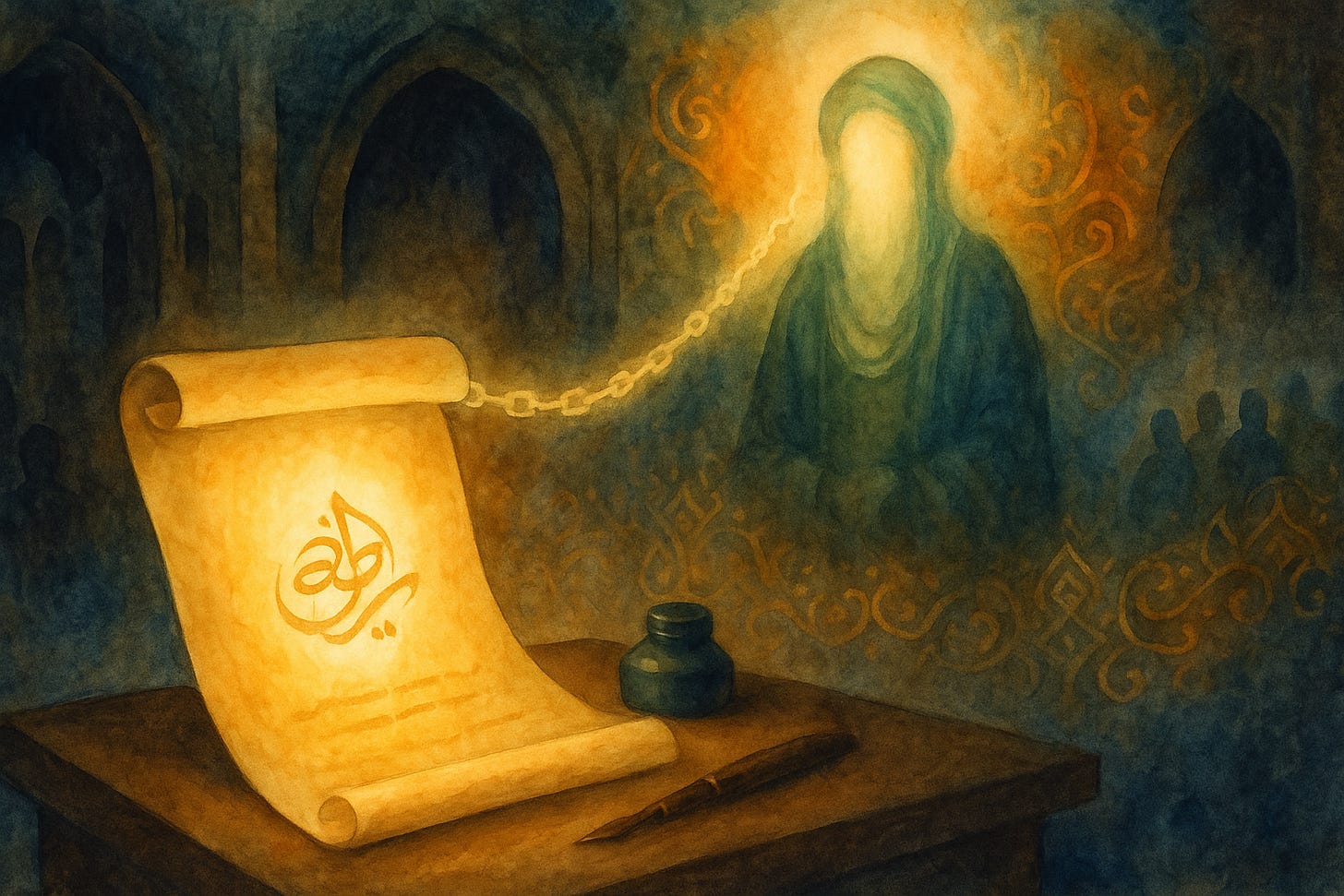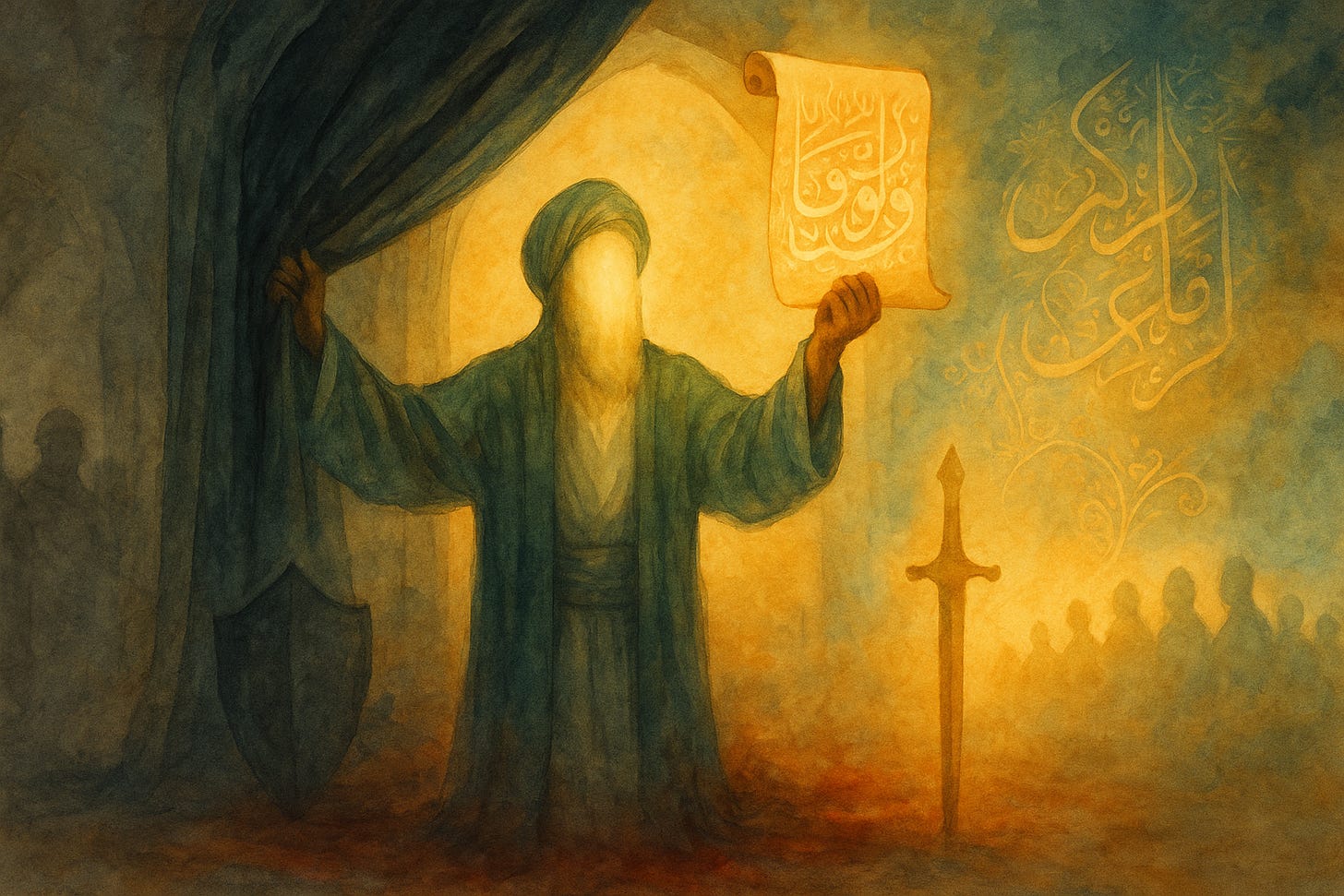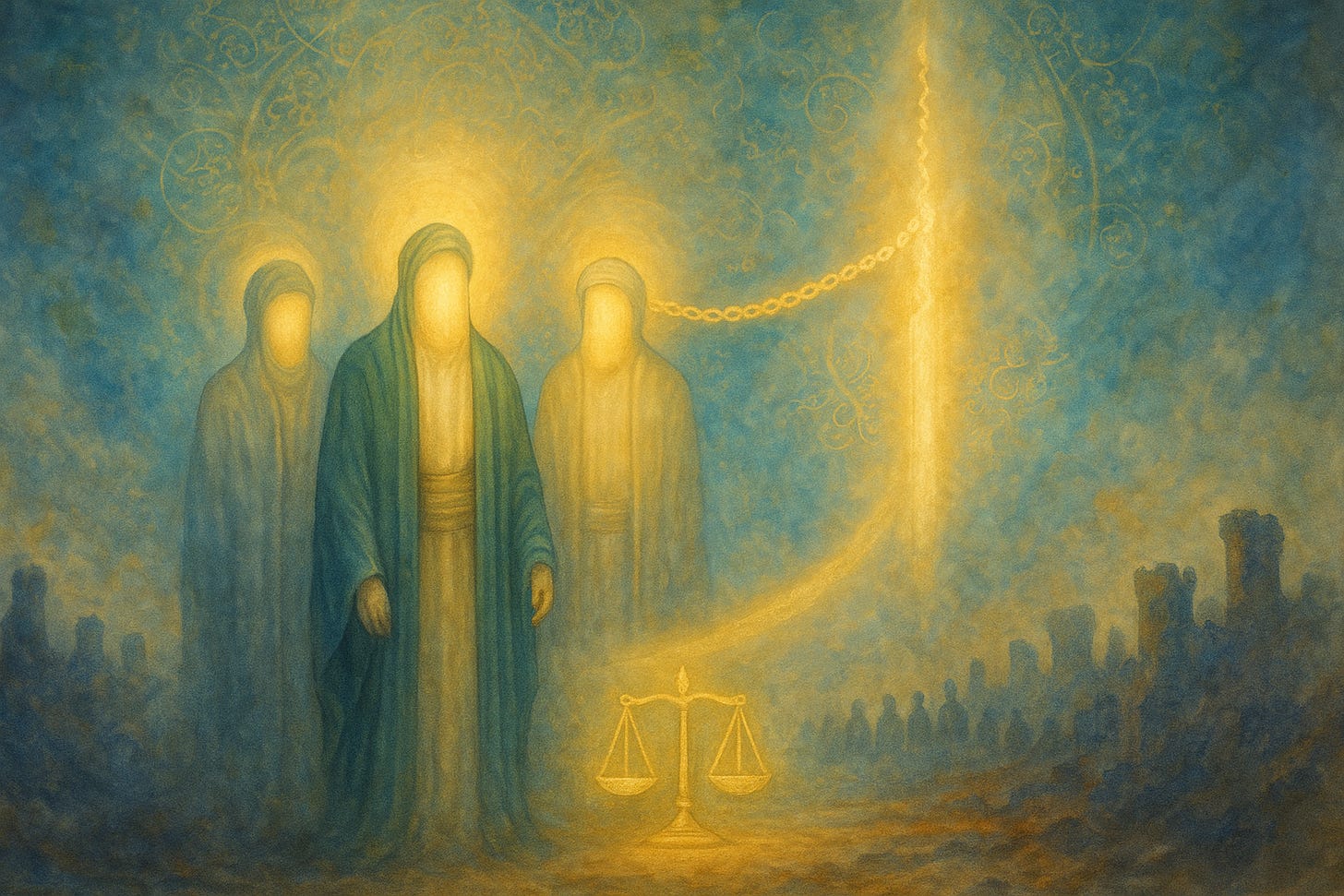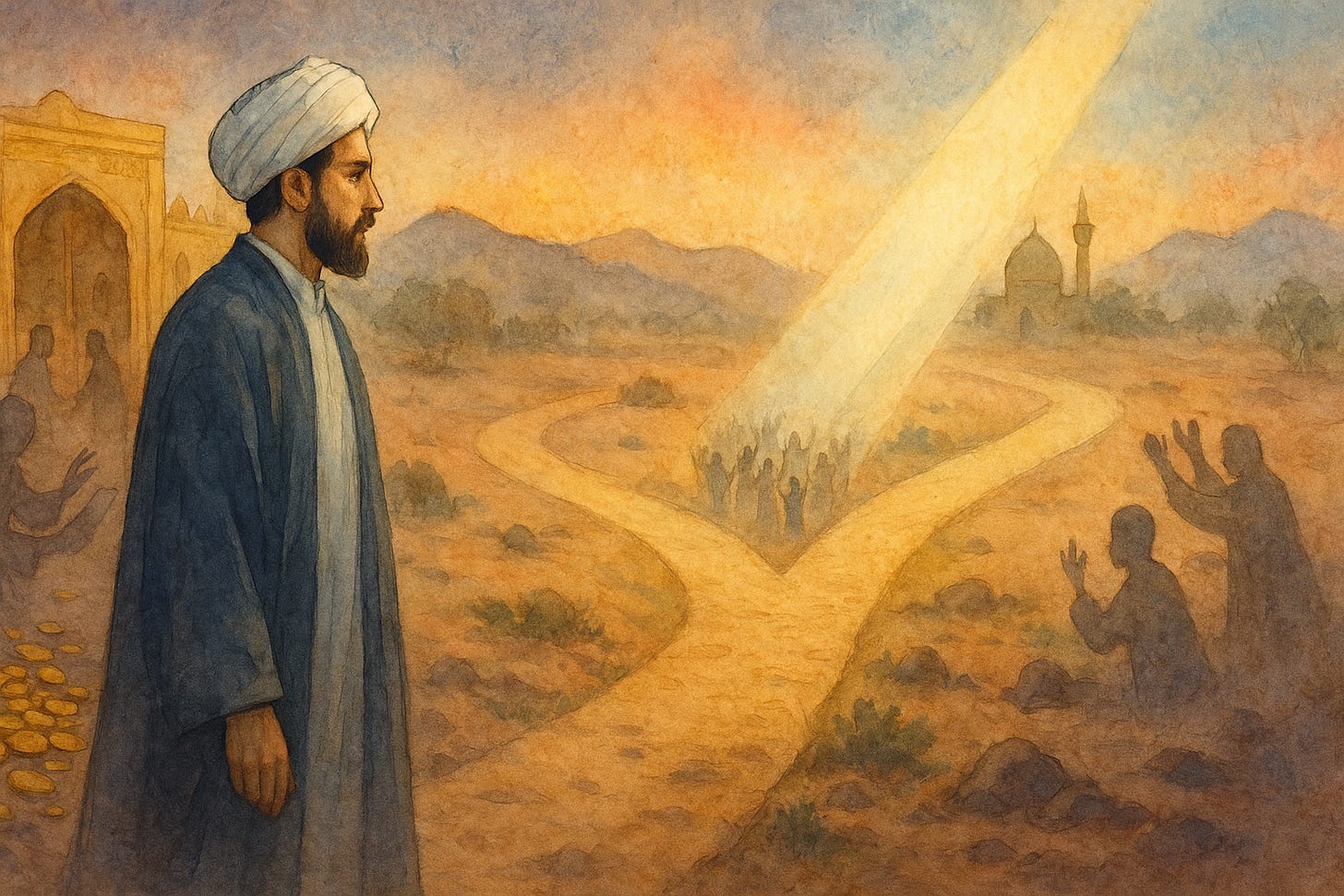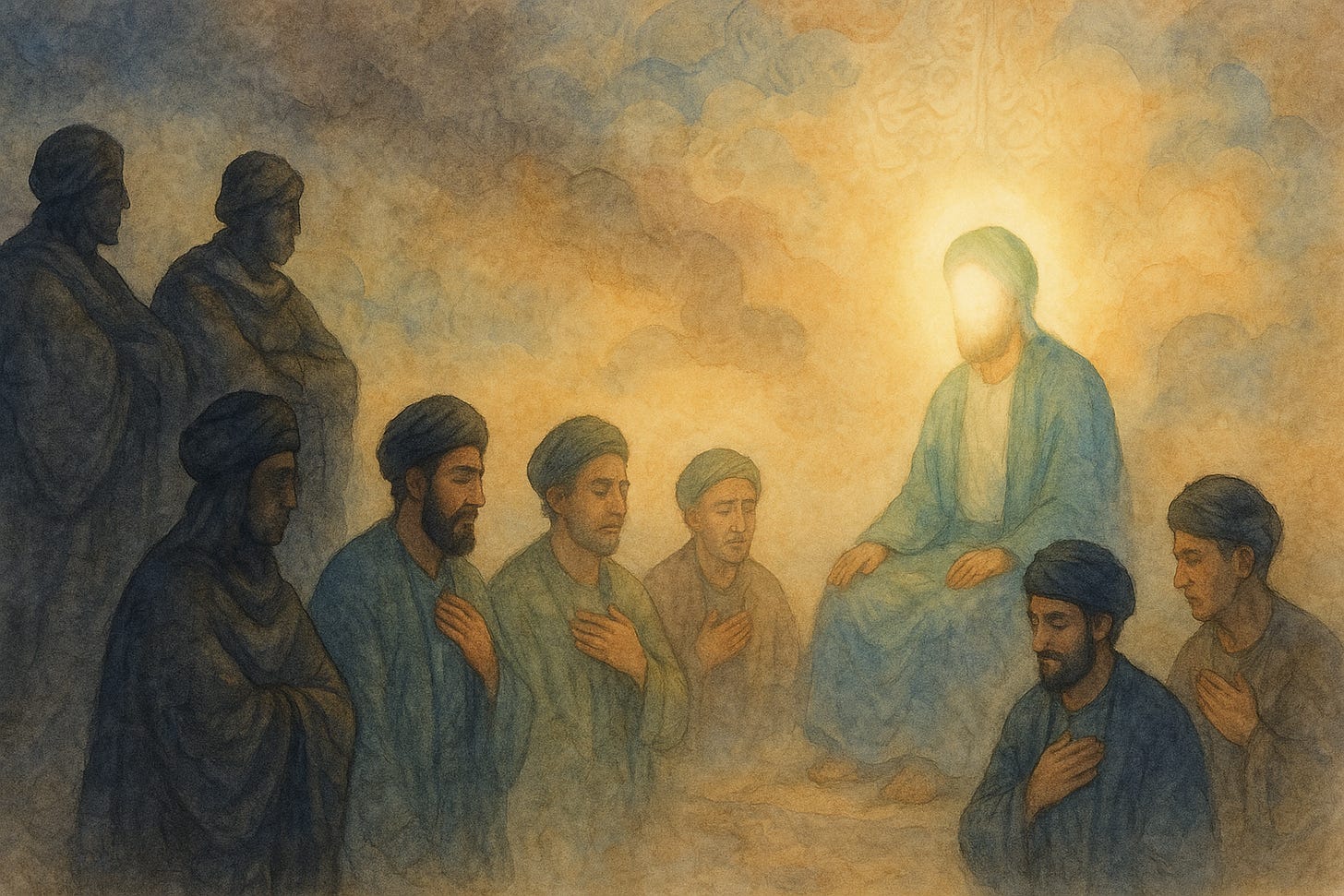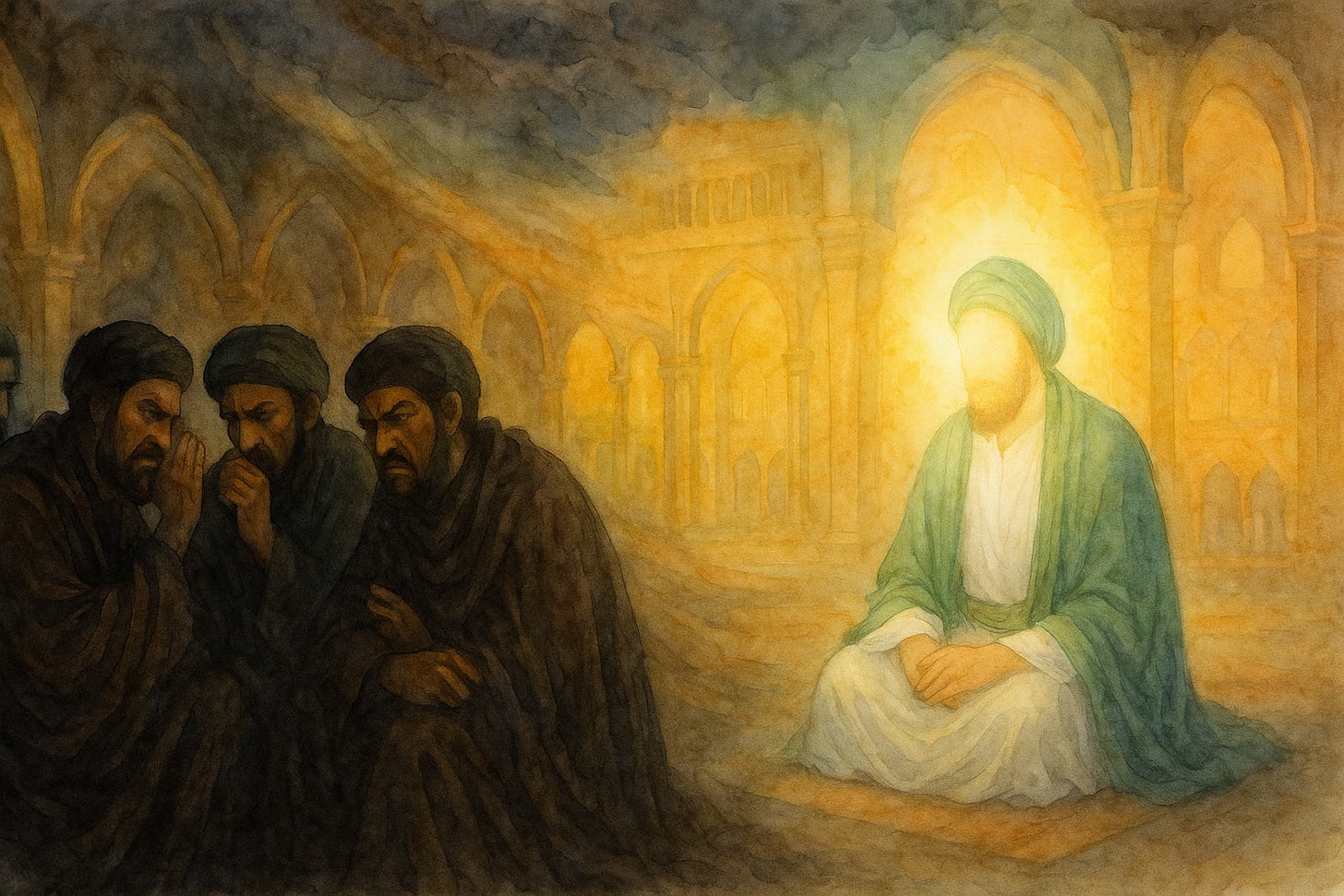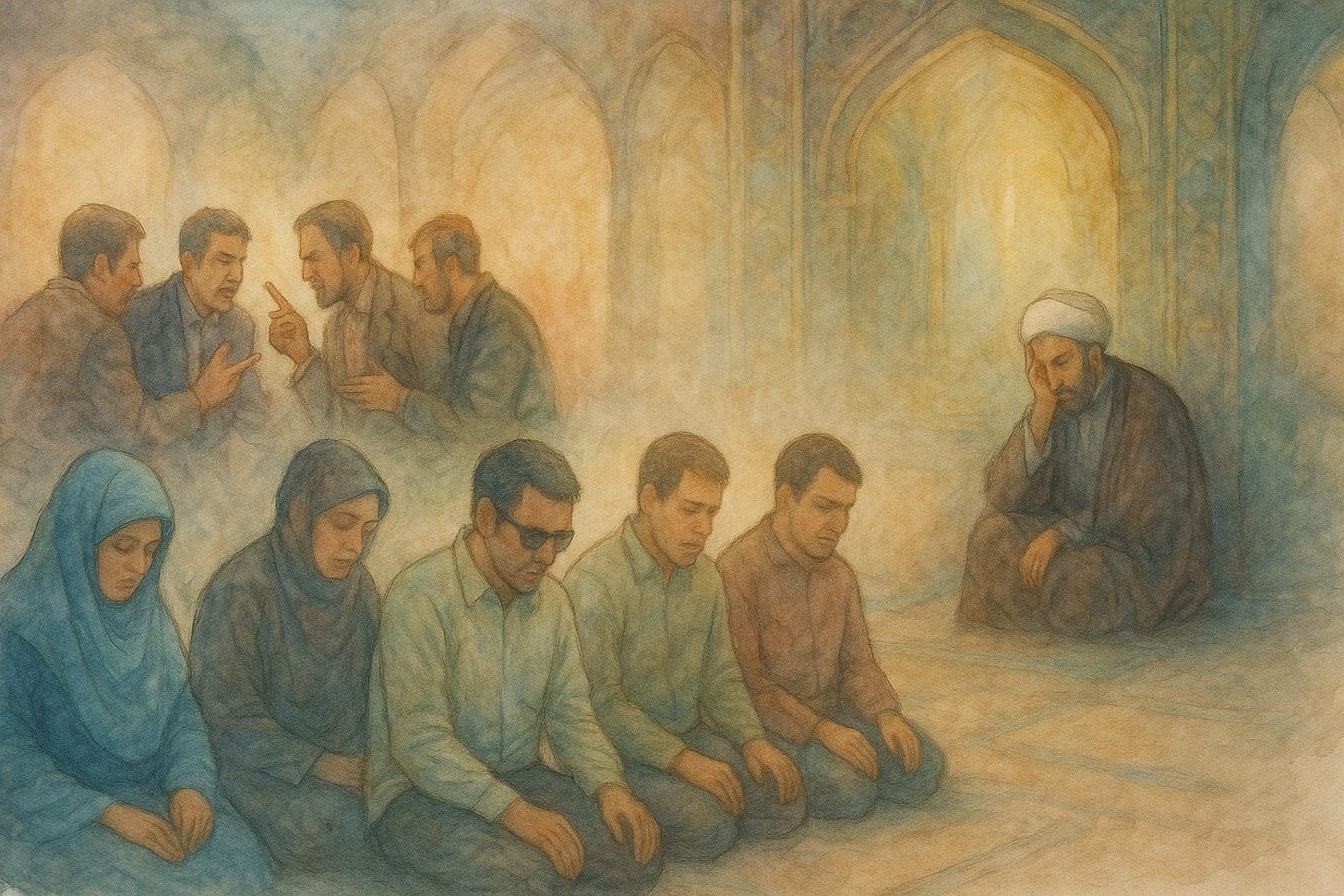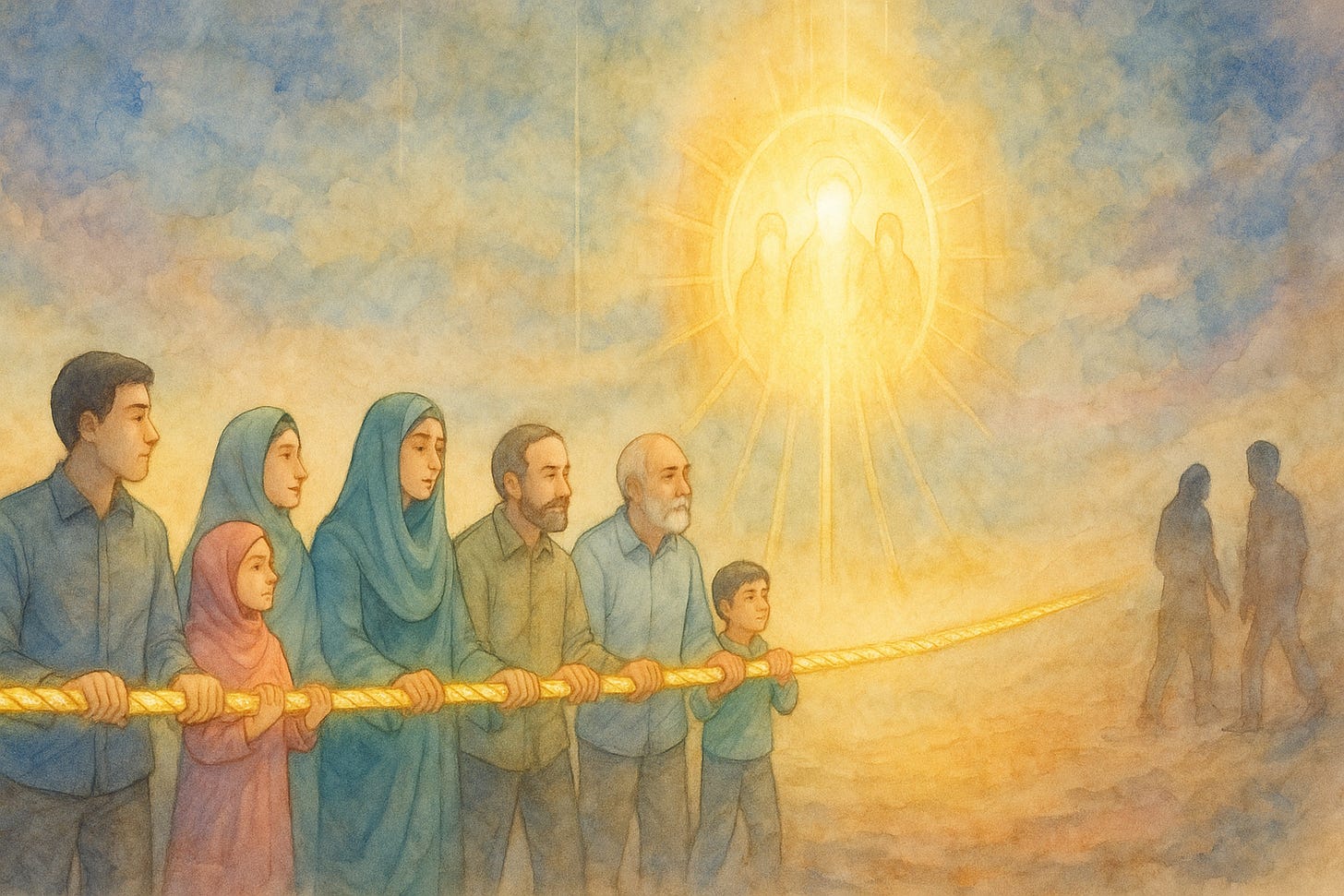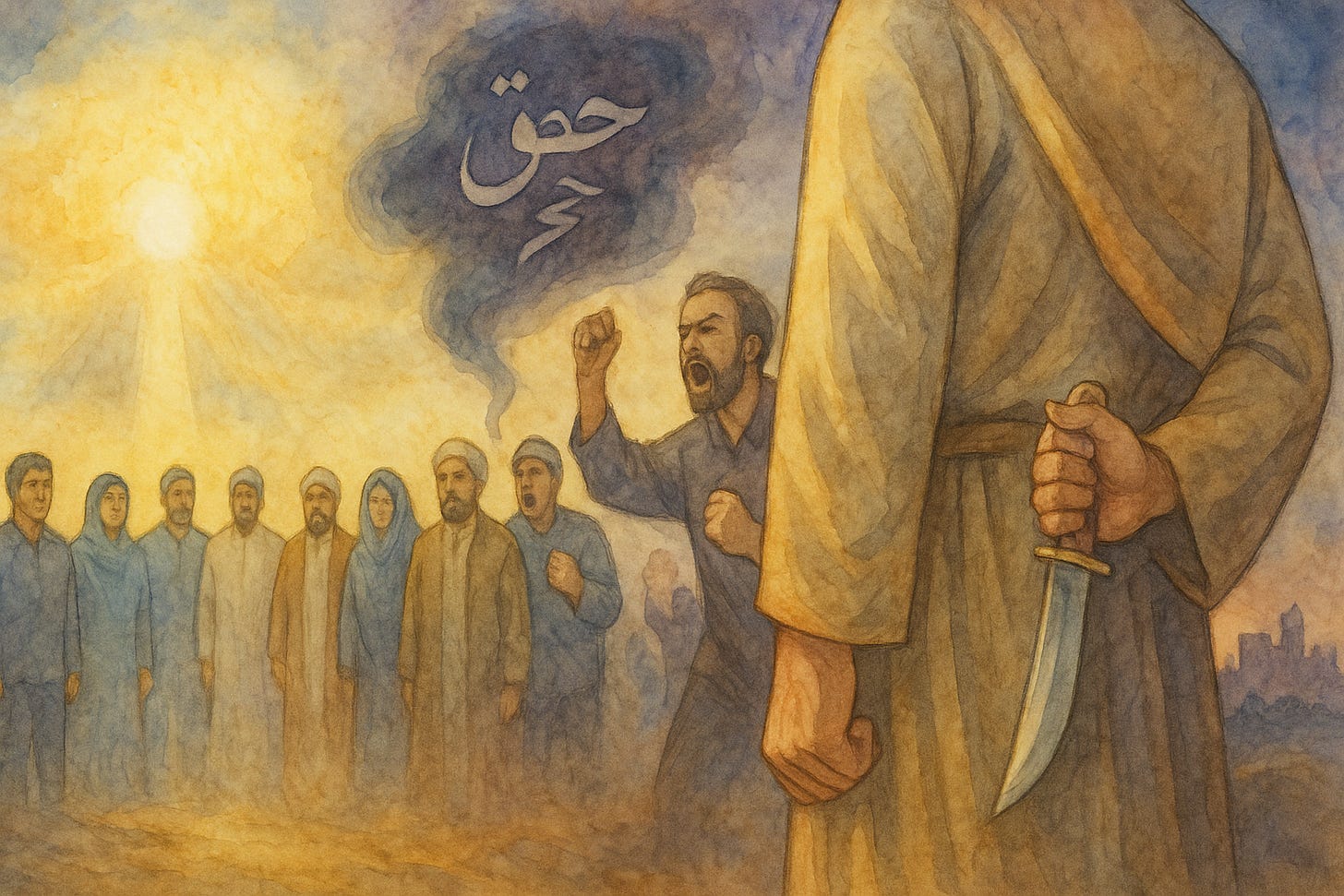[36] Imamah (Leadership) - Imam al-Ridha - Part 4: Imamate Beyond Thrones
A series of discussions on the teachings of Imam Sadiq (sixth Imam of the Muslims), from the book Misbah ash-Sharia (The Lantern of the Path)
In His Name, the Most High
This is part thirty-six of our ongoing series of discussions on the book attributed to Imam al-Sadiq entitled Misbah ash-Sharia (The Lantern of the Path).
Over the past three sessions, we have followed the life and strategy of Imam al-Ridha (peace be upon him) step by step. Beginning with part thirty-three, we opened this new stage of our Wednesday Majalis, shifting into a more focused, layered style of reflection.
Parts thirty-four and thirty-five then carried us deeper into the Imam’s journey, each time uncovering new facets of his mission under the Abbasid rule.
Today we arrive at the fourth and concluding session dedicated to Imam al-Ridha. With it, we will complete this cycle — not in the sense of closing the discussion, for the Imam’s legacy is inexhaustible, but in the sense of bringing together the threads we have been weaving across these past weeks.
As before, we will continue with the three-point method: selecting three key themes, grounding them in the Qur’an, the traditions of the Ahl al-Bayt, and the reflections of scholars, and then distilling each into a call to clarify — a practical lesson for our own time.
The cumulative approach remains essential. This session is not separate from what has come before, but its fulfilment. For this reason, I encourage you to review the earlier parts of this cycle — sessions thirty-three, thirty-four, and thirty-five — so that today’s reflections can be seen in their proper continuity.
With this in mind, we now turn to part thirty-six, to witness how Imam al-Ridha’s Imamate, though burdened by chains and poisoned by tyranny, still became a lantern of clarity for generations.
The previous parts can be found here:
Video of the Majlis (Sermon/Lecture)
This is the video presentation of this write-up as a Majlis (part of the Truth Promoters Weekly Wednesday Majlis Program)
Audio of the Majlis (Sermon/Lecture)
This is the video presentation of this write-up as a Majlis (part of the Truth Promoters Weekly Wednesday Majlis Program)
Recap
A Victory in Refusal
Our previous session analysed the inevitable failure of Ma’mun al-Abbasi’s sophisticated scheme to neutralise Imam al-Ridha (peace be upon him). We explored how the project, which began with the political theatre of appointing the Imam as heir, collapsed under the weight of its own contradictions, ultimately backfiring on the Abbasid regime.
The session detailed this collapse across three interconnected points:
The Failure of Containment From the outset, the Imam’s steadfastness shattered the plan. By accepting the succession only under duress and imposing conditions that stripped him of all executive power, he refused to legitimize the Abbasid state. What Ma’mun intended as an act of co-option became a public display of his regime’s weakness. Instead of containing Shi'ism, the Imam’s elevated position only caused it to grow in influence and loyalty.
The Exposure of Hypocrisy The Imam’s presence in the court served as a mirror, reflecting the deep-seated corruption and moral decay of the Abbasid administration. The stark contrast between his piety and the court's decadence exposed Ma’mun’s claims of religious sincerity as a hollow pretence. The public debates, meant to diminish the Imam, consistently backfired, showcasing his divine knowledge and further revealing the hypocrisy of the ruling power.
From Succession to Assassination Having failed to co-opt or contain the Imam, a defeated Ma’mun resorted to the same crude weapon as his predecessors: assassination. The martyrdom of Imam al-Ridha by poison was the final admission that the caliph's political project was a complete failure. This act of violence, however, did not extinguish the Imam's light. Instead, it immortalized his legacy, turning his shrine in Mashhad into an enduring centre of pilgrimage, while the Abbasid dynasty faded into disgrace.
In short, the session demonstrated that schemes built on deceit are unsustainable. The Imam's unwavering refusal to compromise truth proved that tyranny, whether through overt force or subtle co-option, is ultimately self-defeating.
In His most beautiful Name, and with full trust in His support, imploring His assistance and guidance, we proceed …
Imamah (Leadership) - Imam al-Ridha: Imamate Beyond Thrones
A Divine Reality, Not a Royal Decree: The Essence of Imamate Beyond Thrones and Titles
The Abbasids imagined that legitimacy could be manufactured with crowns, robes, and titles.
They thought they could appoint an Imam as they appointed governors and ministers.
But the essence of Imamate is not subject to royal proclamation. It cannot be conferred by caliphs, nor revoked by poison. Imamate is a divine reality: a covenant with God, rooted in nass (designation), upheld by revelation, and confirmed by His will alone.
Guidance by Divine Command: Scriptural Foundations
The Qur’an leaves no doubt that true leadership is not a worldly succession but a divine appointment:
وَجَعَلْنَاهُمْ أَئِمَّةً يَهْدُونَ بِأَمْرِنَا
“We made them leaders who guided by Our command.”
— Qur’an, Surah al-Anbiya (the Chapter of the Prophets) #21, Verse 73
And again:
وَجَعَلْنَا مِنْهُمْ أَئِمَّةً يَهْدُونَ بِأَمْرِنَا لَمَّا صَبَرُوا وَكَانُوا بِآيَاتِنَا يُوقِنُونَ
“We made from among them leaders who guided by Our command, when they were patient and certain of Our signs.”
— Qur’an, Surah al-Sajdah (the Chapter of the Prostration) #32, Verse 24
Here, leadership is explicitly amr-based — by God’s command — not by the will of men, dynasties, or armies. This is the Qur’anic definition of Imamate.
The Qur’an also binds love and loyalty to the Prophet’s family to the very fabric of faith:
قُل لَّا أَسْأَلُكُمْ عَلَيْهِ أَجْرًا إِلَّا الْمَوَدَّةَ فِي الْقُرْبَىٰ
“Say: I do not ask of you any reward for it except love for my near relatives.”
— Qur’an, Surah al-Shura (the Chapter of the Consultation) #42, Verse 23
And He declares their purification:
إِنَّمَا يُرِيدُ اللَّهُ لِيُذْهِبَ عَنكُمُ الرِّجْسَ أَهْلَ الْبَيْتِ وَيُطَهِّرَكُمْ تَطْهِيرًا
“Indeed, God only desires to remove all impurity from you, O People of the House, and to purify you completely.”
— Qur’an, Surah al-Ahzab (the Chapter of the Confederates) #33, Verse 33
Another foundational verse is when Ibrahim was tested and elevated:
إِنِّي جَاعِلُكَ لِلنَّاسِ إِمَامًا
“I am making you an Imam for the people.”
— Qur’an, Surah al-Baqarah (the Chapter of the Cow) #2, Verse 124
This verse is decisive: even a prophet is not self-appointed as Imam; it is God alone who grants that station.
How then could caliphs imagine they could impose Imamate from their thrones?
A Covenant from God: The Testimony of the Ahl al-Bayt
Imam al-Sadiq (peace be upon him) declared:
إِنَّ الْإِمَامَةَ عَهْدٌ مِنَ اللَّهِ عَزَّ وَجَلَّ مَعْقُودٌ بِنَبِيٍّ، وَمَنْ كَذَبَ بِالإِمَامَةِ كَذَبَ بِالنُّبُوَّةِ
“Indeed, Imamate is a covenant from God, bound to a prophet. Whoever denies the Imamate denies prophethood.”
— Al-Kulayni, Al-Kafi, Volume 1, Page 278, Chapter on Imamate Being a Covenant from God
This hadeeth cuts to the heart of the matter: to strip Imamate of its divine covenant is to mutilate it, just as denying prophethood itself would be.
The Prophet Muhammad (peace and blessings be upon him and his family) confirmed this covenant in his final sermon at Ghadir Khumm:
مَنْ كُنْتُ مَوْلَاهُ فَهَٰذَا عَلِيٌّ مَوْلَاهُ
Whomever I am his master (mawla), this Ali is his master (mawla).
— Ibn Majah, Sunan, Volume 1, Page 43 (Hadeeth of Ghadir)
— Al-Hakim al-Naysabouri, Al-Mustadrak Ala Al-Sahihayn, Volume 3, Page 110-134
— Ibn Hanbal, Musnad, Volume 4, Pages 281, 371 and also Volume 5, Pages 347, 370
— Al-Kulayni, Al-Kafi, Volume 1, Kitab al-Hujjah (the Book of the Proofs), Kitab al-Nass Ala Amir al-Mu’mineen (Chapter on the Explicit Designation of the Commander of the Faithful), Page 420-422, Hadeeth 80-81
— Al-Saduq, Al-Amali, Majlis 58, Hadeeth 5
— Al-Amini, Al-Ghadir fil-Kitab wal-Sunnah wal-Adab, Volume 1, Pages 14-158
— Al-Tusi, Al-Amali, Majalis 18 and 20
And in the Hadith of Thaqalayn:
إِنّي تارِكٌ فيكُمُ الثَّقَلَينِ كِتابَ اللهِ وَعِترَتي أَهلَ بَيتي ما إِن تَمَسَّكتُم بِهِما لَن تَضِلّوا بَعدي أَبَدًا
I am leaving among you two weighty things: the Book of God and my Progeny, my Ahl al-Bayt. If you hold fast to them both, you will never go astray after me.
— Al-Kulayni, Al-Kafi, Volume 1, Kitab al-Hujjah (the Book of the Proof), Chapter 85, Hadeeth 3
— Al-Naysaburi, Sahih Muslim,Volume 4, The Book of Virtues (Kitab Fada’il al-Sahabah), Chapter on the Merits of Ali ibn Abi Talib (Bab min Fada’il Ali ibn Abi Talib), Hadeeth 5920, Page 1873
— Al-Tirmidhi, Jami‘ al-Tirmidhi (Sunan al-Tirmidhi), Volume 5, The Book of Virtues (Kitab al-Manaqib), Chapter on the Merits of Ahl al-Bayt (Bab Manaqib Ahl Bayt al-Nabi), Hadeeth 3788, Page 663
Together these establish that Imamate is inseparable from Prophethood, both designated by God.
“Do Not Be Deceived”: Imam al-Ridha’s Warning
When people congratulated Imam al-Ridha (peace be upon him) on being named heir by Ma’mun, he cautioned them:
لَا تُغْتَرُّوا، فَإِنَّ هَذَا أَمْرٌ لَا يَتِمُّ
“Do not be deceived, for this matter will not be fulfilled.”
— Al-Saduq, Uyun Akhbar al-Ridha, Volume 2, Page 145
The title bestowed by Ma’mun was an empty theatre. Imamate is decreed not from thrones but from heaven.
A Responsibility, Not a Prize: Voices of the Scholars
Ayatullah Jawadi-Amoli reminds us:
امام به امر خدا قیام میکند، نه با آراء مردم و نه با شمشیرها.
“The Imam rises and leads only by God’s Command — not by the votes of the people, and not by the power of swords.”
— Ayatullah Jawadi-Amoli, Tafsir Tasnim, commentary on Surah al-Sajdah (the Chapter of the Prostration) #32, Verse 24
Ayatullah Fadhlullah (may God rest his pure soul) adds:
الإِمَامَةُ هِيَ مَسْؤُولِيَّةٌ تَكْلِيفِيَّةٌ، لا تَشْرِيفِيَّةٌ، يَحْمِلُهَا مَنْ جَعَلَهُ اللَّهُ، لا مَنْ عَيَّنَهُ السُّلْطَانُ
“Imamate is a responsibility, not an honorary title. It is carried by whom God appoints, not by whom the ruler designates.”
— Ayatullah Fadhlullah, Min Wahy al-Qur’an, Volume 12, Page 59 (Commentary on Surah al-Sajdah (the Chapter of the Prostration) #32, Verse 24)
And Imam Khomeini (may God rest his pure soul) said in Najaf:
امامت یک منصب الهى است که هیچکس از بندگان حق ندارد در آن دخالت کند.
“Imamate is a Divine office, into which no human being has the right to interfere.”
— Imam Khomeini, Sahifa-ye Imam, Volume 3, Page 46
A Divine Trust, Not a Worldly Kingdom
The Abbasids mistook Imamate for monarchy — a throne of inheritance and armies. But the Imams consistently clarified that it is an amanah, a trust from God.
Imam al-Baqir (peace be upon him), explaining Qur’an, Surah al-Nisa (the Chapter of the Women) #4, Verse 58 —
إِنَّ اللَّهَ يَأْمُرُكُمْ أَن تُؤَدُّوا الْأَمَانَاتِ إِلَىٰ أَهْلِهَا
“Indeed, God commands you to render trusts to whom they are due”
— Qur’an, Surah al-Nisa (the Chapter of the Women) #4, Verse 58
— said:
أَمَرَ اللَّهُ الْإِمَامَ مِنَّا إِذَا حَضَرَتْهُ الْوَفَاةُ أَنْ يَدْفَعَ الْإِمَامَةَ إِلَى أَحَدٍ مِنْ وُلْدِهِ. لَيْسَ لَهُ أَنْ يَزْوِيَهَا عَنْهُ.
“God has commanded that when death approaches the Imam from among us, he must deliver the Imamate to one of his sons. It is not for him to withhold it from him.”
— Al-Kulayni, Al-Kafi, Volume 1, Page 276
And Shaykh al-Mufid, in Kitab al-Irshad, defined the Imam not by political power but by divinely granted qualities:
الإمام هو الذي له الرئاسة العامة في أمور الدين والدنيا جميعاً، يجب أن يكون معصوماً من الذنوب والخطأ، كاملاً في العلم، أفضل أهل زمانه في ذلك.
“The Imam is the one who has general leadership in the affairs of religion and the world. He must be infallible from all sins and errors, and the most knowledgeable person of his time.”
— Al-Mufid, Kitab al-Irshad, Volume 1, Page 15
Ma’mun could offer titles and palaces, but he could not grant infallibility, divine knowledge, or the status of hujjah. This is why his scheme was doomed: he mistook crowns for wilayah.
Lessons for the Present: Thrones Fall, Wilayah Endures
Today, too, many attempt to reduce religion to politics, to dynasties, or to parliaments. But the lesson of Imam al-Ridha is eternal: divine leadership cannot be co-opted. Thrones crumble, empires collapse, but the wilayah of the Ahl al-Bayt endures.
Imam Khamenei (may God protect him) has reminded us:
امامت یک حقیقت الهی است که در طول تاریخ ادامه دارد و ظالمان قادر به ابطال آن نیستند.
“Imamate is a Divine truth, one that continues throughout history, and the oppressors are never able to nullify it.”
— Imam Khamenei, Speech on Wilayah, 28 March 2000, in Majmu’eh‑ye Ruhaniyat wa Wilayat (Collections of Clergy and Wilayah), Volume 6, Page 213
Call to Clarify: Legitimacy Comes from God, Not Thrones
Clarify that Imamate is a divine covenant, not a political office.
Clarify that legitimacy does not flow from thrones, nor from votes, nor from swords — but only from God.
Clarify that loyalty to the Imam of our age — Imam al-Mahdi (may God hasten his reappearance) — is the axis of faith.
Do not be deceived by the trappings of power. Remember that the light of Imamate shines beyond every crown, every empire, and every age.
The Architecture of a Stance: How the Imam's Stance Became a Source for Law and Ethics
Imam al-Ridha (peace be upon him) was not simply living through history — he was writing fiqh with his stance. Every condition he set, every refusal he made, every word of warning he spoke became a living lesson in jurisprudence and political ethics.
The Conditions of Non-Legitimation: A Masterclass in Political Jurisprudence
The Imam's stance was not a simple, emotional refusal. It was a calculated, jurisprudential masterstroke. When Ma’mun made it clear that death was the only alternative to accepting the heir-apparency, Imam al-Ridha agreed, but only after publicly declaring his coercion and laying down a set of precise, debilitating conditions.
He famously told Ma’mun:
فَقَالَ لَهُ الرِّضَا عَلَيْهِ السَّلَامُ: فَإِنِّي أُجِيبُكَ إِلَى مَا تُرِيدُ مِنْ وِلَايَةِ الْعَهْدِ، عَلَى أَنِّي لا آمُرُ وَلا أَنْهَى، وَلا أُفْتِي وَلا أَقْضِي، وَلا أُوَلِّي وَلا أَعْزِل، وَلا أُغَيِّرُ شَيْئاً مِمَّا هُوَ قَائِمٌ.
And Imam al-Ridha said to him (Ma’mun): "I will accept this affair on the condition that I will not command, nor forbid, nor issue legal rulings, nor judge. I will not appoint anyone, nor depose anyone, nor will I change anything from its current state."
— Shaykh al-Saduq, Uyun Akhbar al-Ridha, Volume 2, Page 149
Each condition was a surgical cut severing the link between himself and the regime's actions. By refusing to appoint or dismiss officials, he absolved himself of the state's corruption and tyranny.
By refusing to issue commands or prohibitions, he ensured that no injustice could be carried out in his name.
By refusing to alter any existing custom or law, he prevented his presence from being used to rubber-stamp Abbasid policy.
In essence, he accepted a title but handed back all its power, leaving Ma’mun holding an empty crown.
He transformed the position of heir apparent from a seat of power into a platform for principled disavowal, demonstrating for all time how to engage with an oppressive system without granting it an ounce of legitimacy.
Measured by Necessity: The Principle of Cooperating with Tyrants Only Under Duress
The Imam accepted succession only under explicit threat of death. He made sure everyone knew it was coercion. This sets a clear principle: cooperation with tyrants is only permissible under duress, and even then it must be stripped of legitimacy.
Ayatullah Sistani has emphasised:
لَا يَجُوزُ التَّعَاوُنُ مَعَ الْحُكُومَاتِ الْجَائِرَةِ إِلَّا فِي حَالَةِ الضَّرُورَةِ وَبِقَدْرِ الضَّرُورَةِ
“It is not permissible to cooperate with tyrannical (oppressive) governments except in cases of necessity, and only to the extent required by that necessity.”
— Ayatullah Sistani, al-Fatawa al-Wadhihah, Volume 2, Page 314
The Imam’s example is exactly this: a coerced acceptance, bound by conditions, never affirming legitimacy.
The Abuse of Necessity: Cloaking Complicity in False Authority
But how often is this principle twisted in our own age? There are those in our communities who wrap themselves in the language of dharura (necessity), while their actions reveal nothing of necessity at all.
They claim closeness to the maraji, speak of conversations with Najaf, and present themselves as leaders of prayer and guidance. Yet their dealings strengthen the hand of the oppressors, even deepening the reach of the Zionist entity itself.
Where is the “necessity” in such acts?
Was there a sword at their neck?
Was there a choice between death and reluctant cooperation?
No. Instead, careers, contracts, and ambitions are painted with the brush of dharura — turning what is optional into what is supposedly unavoidable.
This is not necessity; it is self-deception.
The ruling of Ayatullah Sistani is clear:
لَا يَجُوزُ التَّعَاوُنُ مَعَ الْحُكُومَاتِ الْجَائِرَةِ إِلَّا فِي حَالَةِ الضَّرُورَةِ وَبِقَدْرِ الضَّرُورَةِ
“It is not permissible to cooperate with tyrannical (oppressive) governments except in cases of necessity, and only to the extent required by that necessity.”
— Ayatullah Sistani, al-Fatawa al-Wadhihah, Volume 2, Page 314
To violate this ruling, while invoking his name, is a double betrayal: a betrayal of the marja and a betrayal of the believers who trust his authority.
Such a person may win worldly respect, but they cannot stand as just before God.
A believer cannot pray behind them, for justice (adalah) is absent. And when they cloak their actions in the marja’s name, they risk deceiving the faithful into legitimising what God has made illegitimate.
The Qur’an warns:
فَلَا تُطِعِ الْمُكَذِّبِينَ • وَدُّوا لَوْ تُدْهِنُ فَيُدْهِنُونَ
“So do not obey the deniers. They wish that you would compromise, so they would compromise.”
— Qur’an, Surah al-Qalam (the Chapter of the Pen) #68, Verses 8–9
Let it be known: to invoke the marja while walking hand in hand with tyrants is not leadership — it is corruption. To excuse oneself with false necessity is not jurisprudence — it is betrayal.
Imam Ali (peace be upon him) declared:
إِنَّ شَرَّ النَّاسِ عِنْدَ اللَّهِ يَوْمَ الْقِيَامَةِ كُلُّ مُتَجَرِّئٍ فِي دِينِ اللَّهِ، لَا يَهْتَمُّ بِمَا صَنَعَ فِي أُمَّتِهِ.
“The worst of people before God on the Day of Judgement is everyone who dares to meddle in the religion of God, without any concern for the havoc he wreaks upon His community.”
— Nahj al-Balagha, Saying (Hikmah) 105
Aside: What is a Tawqi’?
We will soon encounter the term tawqi’. A fuller treatment will come later when we discuss Mahdawiyyah — the era and mission of Imam al-Mahdi (may our souls be his ransom, and may God hasten his return) — but for now, here is a brief introduction.
In Shia history, especially during the Minor Occultation (al-Ghaybah al-Sughra), Imam al-Mahdi was no longer physically visible to the community, yet he continued to guide and communicate with them. One of the key ways this happened was through written replies sent via his four trusted deputies.
These communications were called tawqi’at (singular: tawqi’). The word tawqi’ literally means a signed statement or an official reply. They contained:
Answers to questions posed by the Shia,
Instructions for the community in the face of political oppression,
Clarifications against the claims of false leaders.
Thus, a tawqi’ was far more than an ordinary letter: it was received and recognised as the direct voice of the Imam to the believers. The collection of these tawqi’at shows that, even while hidden, the Imam remained an active source of guidance, protection, and clarification for the Shia community.
And in a tawqi’ (signed letter) of Imam al-Mahdi (may God hasten his return), our beloved Imam warns:
فَأَمَّا الْحَوَادِثُ الْوَاقِعَةُ فَارْجِعُوا فِيهَا إِلَى رُوَاةِ حَدِيثِنَا، فَإِنَّهُمْ حُجَّتِي عَلَيْكُمْ، وَأَنَا حُجَّةُ اللَّهِ.
“As for the events that occur, refer in them to the narrators of our traditions, for they are my proof over you, and I am the proof of God.”
— Al-Tusi, Al-Ghaybah, p. 177
How then can anyone claim the authority of Najaf, while trampling upon the rulings of Najaf?
How can one invoke the name of the marja, yet act as an instrument of the oppressors?
This is not wilayah — it is rebellion against it.
The Art of Taqiyyah, The Duty of Tabyeen: How the Imam Knew When to Conceal and When to Clarify
For decades, the Shia had lived under taqiyyah — strategic concealment to preserve life and community. But in Marv, with succession forced upon him, Imam al-Ridha used tabyeen — clarification — to proclaim truth on the grandest stage.
Imam al-Sadiq (peace be upon him) had taught:
التَّقِيَّةُ دِينِي وَدِينُ آبَائِي، وَلَا إِيمَانَ لِمَنْ لَا تَقِيَّةَ لَهُ
“Taqiyyah is my religion and the religion of my forefathers. There is no faith for the one who has no taqiyyah.”
— Al-Kulayni, Al-Kafi, Volume 2, Page 219, Book of Faith and Disbelief, Chapter on Strategic Prudence (Taqiyyah), Hadeeth 3
But taqiyyah was never an end — it was a means until the moment came to clarify. Imam al-Ridha shows us that when God places the pulpit of history before you, silence is no longer protection but betrayal.
Ayatullah Fadhlullah (may God rest his pure soul) explained:
التَّقِيَّةُ سِلَاحٌ لِلضَّعْفِ، أَمَّا التَّبْيِينُ فَسِلَاحٌ لِلْقُوَّةِ، وَالْإِمَامُ الرِّضَا جَمَعَ بَيْنَهُمَا بِحِكْمَةٍ
“Taqiyyah is a weapon for weakness, while tabyeen is a weapon for strength — and Imam al-Ridha combined them with wisdom.”
— Ayatullah Fadhlullah, Fiqh al-Hayat, Volume 4, Page 87
Those Vested with Authority: Why Uli al-Amr Must Be Divinely Protected from Error
The Qur’an commands:
يَا أَيُّهَا الَّذِينَ آمَنُوا أَطِيعُوا اللَّهَ وَأَطِيعُوا الرَّسُولَ وَأُولِي الْأَمْرِ مِنكُمْ
“O you who have faith! Obey God and obey the Messenger and those vested with authority among you.”
— Qur’an, Surah al-Nisa (the Chapter of the Women) #4, Verse 59
Allamah Tabataba’i, in his al-Mizan, comments that uli al-amr must be those divinely protected from error (ma‘sumin), otherwise obedience would contradict the Qur’an’s command to avoid injustice.
فلو كان أولوا الأمر غير معصومين، لم ينفك أمرهم عن المعصية والخطأ، والأمر باتباعهم مطلقاً مع هذه الحال أمر باتباع المعصية والخطأ، وهو محال على الله سبحانه، لأنه تعالى يقول: (إِنَّ اللَّهَ لا يَأْمُرُ بِالْفَحْشاء) [الأعراف: 28]. فثبت أن أولي الأمر الذين أوجب الله طاعتهم مطلقاً لا بد أن يكونوا معصومين.
“If the possessors of authority were not infallible, their commands would inevitably involve sin and error. To command obedience to them unconditionally in such a state would be to command obedience to sin and error — and this is impossible for God, the Exalted, for He has said: ‘Indeed, God does not command indecency’ (7:28). It is therefore established that the ‘possessors of authority’ whom God has made unconditionally obligatory to obey must indeed be infallible.”
— Allamah Tabataba’i, Al-Mizan, Volume 4, Page 383, Commentary on Surah al-Nisa (the Chapter of the Women) #4, Verse 59
This verse underlines that obedience to legitimate divine authority — in the Prophet, the Imams, and by extension in their representatives — is non-negotiable.
Inside the Palace, Not of It: The Imam's Lesson on Engaging Power Without Surrendering Principle
Imam al-Ridha’s stance is a model for all who engage with unjust systems. He shows us how to enter without absorption, how to be present without legitimising, how to speak truth without fear.
Imam Khomeini (may God bless his pure soul) taught:
تا وقتی که در زمین طاغوت وجود دارد، وظیفۀ علماست که حقایق دین را بیان کنند و ماهیت سلطه را افشا نمایند.
“As long as there exists a taghut (tyrannical power) upon the earth, it is the duty of the scholars to explain the truths of religion and to expose the essence of tyranny.”
— Imam Khomeini, Sahifeh-ye Imam, Volume 7, Page 442
The martyred leader, Sayyed Hassan Nasrallah, echoed this in our own century:
الْعَالِمُ الَّذِي يَسْكُتُ عَنْ بَاطِلِ الْحُكَّامِ يُشَارِكُهُمْ فِي الْجَرِيمَةِ
“The scholar who remains silent about the falsehood of rulers shares with them in the crime.”
— Sayyed Hassan Nasrallah, Khitab al-Nasr (Victory Speech), Dahiyeh, Beirut, 22 September 2006
And Sayyed Abbas al-Mousawi, the martyred leader of Hizbullah, declared:
إِنَّ الْإِمَامَ الرِّضَا عَلَّمَنَا أَنْ نَكُونَ فِي الْقَصُورِ بِلَا أَنْ نَكُونَ مِنْ أَهْلِ الْقُصُورِ
“Imam al‑Ridha (peace be upon him) taught us how to be within the palaces without ever becoming of the people of the palaces.”
— Sayyed Abbas al-Musawi, Khitabat wa Kalimat al‑Shahid al‑Sayyid Abbas al‑Musawi, Page 112.
This is the jurisprudence of resistance: to navigate systems without losing integrity, to survive without surrendering, and to clarify even in the heart of oppression.
Lessons for the Present: Why Survival Without Integrity is a Form of Failure
In Gaza, in Yemen, in oppressed lands, indeed, in the collective West, also Muslims and Muslim communities are offered compromise: funds in exchange for silence, positions in exchange for legitimacy.
Imam al-Ridha teaches that survival without integrity is failure. Taqiyyah has its place, but tabyeen is our duty when the oppressed cry out.
And when legitimate authority — the Imam in his time, and today the wali al-faqih and the maraji‘ — clarifies the path, disobedience does not strengthen communities; it fractures them. We will explore this further in the next point.
Call to Clarify: Refusing Silence in the Face of Genocide
Clarify that cooperation with tyranny is only ever under duress, never voluntary, and always stripped of legitimacy.
Understand the balance: taqiyyah protects in weakness, but tabyeen proclaims in strength.
Demand from our scholars and leaders the courage of Imam al-Ridha — presence without absorption, speech without compromise.
Prepare for Imam al-Mahdi (may God hasten his reappearance) by refusing silence in the face of genocide, hypocrisy, and oppression.
More Pious Than the Imam: When Loyalty Becomes a Cloak for Arrogance and Fitnah
One of the most painful yet instructive lessons from the life of Imam al-Ridha (peace be upon him) is that the gravest challenges to divine leadership often arise not from the swords of enemies, but from the very ranks of one’s own followers.
The Qur’an warns repeatedly against fitnah — trial, tribulation, and, most dangerously, civil discord and sedition. It states with piercing clarity:
وَالْفِتْنَةُ أَشَدُّ مِنَ الْقَتْلِ
“And persecution (al-fitnah) is worse than killing.”
— Qur’an, Surah al-Baqarah (the Chapter of the Cow) #2, Verse 191
Why is fitnah worse?
Because while an external enemy may kill bodies, internal division kills the very soul of the community.
The Trial of the Heir-Apparency
When Imam al-Ridha was forced to accept the heir-apparency under Ma’mun al-Abbasi, some of the Shia faltered. Unable to perceive the strategic wisdom behind the poisoned chalice, they fell into the very fitnah the Qur’an warns against.
They looked only at the outward appearance of his presence in the palace. In their limited judgement, they accused him of compromise. A few even plotted against him, believing themselves more loyal to the truth than the Imam himself.
But this was not piety — it was arrogance cloaked in the language of piety. It was the fatal error of elevating one’s own limited opinion above the wisdom of the Proof of God.
As the Imam himself said of such people:
إنَّما شُبِّهَ عَلَى هَؤُلاءِ القَومِ لِضَعفِ عُقُولِهِم وَقِلَّةِ بَصَائِرِهِم
“These people were confused because of the weakness of their intellects and the blindness of their insight.”
— Al-Saduq, Uyun Akhbar al-Ridha, Volume 2, Page 171
In their zeal, they became what we might call today “more Catholic than the Pope” — and in doing so, they served the enemy’s purpose better than the enemy himself.
The Modern Parallel: Fracturing the Ummah Through Zealotry
We have seen echoes of this in our own time. In one Muslim community, a group of believers — generally good people, but blinded by ego, weakness of faith, or sheer ignorance — rejected the instructions of the representative of the Wali al-Faqih.
They launched a campaign to oust him. Letters were written, whispers spread, pressure applied. But when the Leader replied, he did not remove the representative — instead, he extended his term, granting him another two years.
This was a clear and powerful signal.
Yet the troublemakers refused to accept it. They continued their campaign, fracturing the community.
The consequences were severe:
mistrust of scholars and leaders,
ordinary believers reduced to ritualistic attendance at mosques — lifeless, without purpose,
others abandoning the mosque altogether,
scholars growing fearful of engaging too closely with people, lest they too become targets of zealotry.
Ultimately, the representative resigned under the weight of constant harassment.
Thus, those who wore wilayah as a badge of pride ended up breaking the will of the Wali’s envoy — not because he was unfit, but because they could not comprehend his wisdom, nor approach him with humility.
The Qur’anic Mandate of Obedience and Unity
The Qur’an warns explicitly against such arrogance:
يَا أَيُّهَا الَّذِينَ آمَنُوا أَطِيعُوا اللَّهَ وَأَطِيعُوا الرَّسُولَ وَأُولِي الْأَمْرِ مِنكُمْ
“O you who have faith! Obey God, and obey the Messenger, and those vested with authority among you.”
— Qur’an, Surah al-Nisa (the Chapter of the Women) #4, Verse 59
And it commands:
وَاعْتَصِمُوا بِحَبْلِ اللَّهِ جَمِيعًا وَلَا تَفَرَّقُوا
“Hold fast, all together, to the rope of God, and do not be divided.”
— Qur’an, Surah Aal-e-Imran (the Chapter of the Family of Imran) #3, Verse 103
To obey uli al-amr (those vested with authority) is not blind obedience to tyrants.
It is loyalty to the Prophet, the Imams, and — in the ghaibah of Imam al-Mahdi (may God hasten his reappearance) — to those who carry their trust: the righteous maraji’ and above all the wali al-faqih.
Imam al-Sadiq (peace be upon him) said:
مَنْ خَالَفَ أَمْرَ الْإِمَامِ أَوْ جَحَدَ حَقَّهُ فَقَدْ جَحَدَ حَقَّ رَسُولِ اللَّهِ، وَمَنْ جَحَدَ حَقَّ رَسُولِ اللَّهِ فَقَدْ جَحَدَ حَقَّ اللَّهِ
“Whoever opposes the command of the Imam or denies his right has denied the right of the Messenger of God; and whoever denies the right of the Messenger of God has denied the right of God.”
— Al-Kulayni, Al-Kafi, Volume 1, Page 372, Kitab al-Hujjah (Book of the Proofs), Chapter “On Whoever recognised the Imam and did not transgress against him.”, Hadeeth 1
Disobedience fractures the ummah, and becomes a denial of the very covenant of God.
The Greatest Losers: Thinking They Do Good While Spreading Fitnah
The Qur’an paints their tragedy vividly:
قُلْ هَلْ نُنَبِّئُكُم بِالْأَخْسَرِينَ أَعْمَالًا
الَّذِينَ ضَلَّ سَعْيُهُمْ فِي الْحَيَاةِ الدُّنْيَا وَهُمْ يَحْسَبُونَ أَنَّهُمْ يُحْسِنُونَ صُنْعًا“Say, shall We inform you of the greatest losers in their works? Those whose efforts are misguided in this life, while they suppose they are doing good.”
— Qur’an, Surah al-Kahf (the Chapter of the Cave) #18, Verses 103–104
Allamah Tabataba’i explains in al-Mizan that these are people whose deeds are wasted because they mistook their own self-devised path for divine service.
… السعي كأنه ضلّ الطريق فانتهى به السير إلى خلاف غرضه. والإنسان ربما يخسر في السعي، لكنه مرجُو النجاة، وإن أخطأ الطريق وأصاب غير الحق وسكن إليه، فصار…
“… effort may resemble one who has lost the road, ending up walking in a way contrary to his destination. And a person may suffer loss in his striving, yet still hope for salvation; even if he errs in the path, reaches something other than what is right, and settles therein, then he becomes …”
— Allamah Tabataba’i, Al-Mizan, Volume 13, Page 399, Section on the Discussion of Surah al-Kahf, specifically verses 103-104, and the nature of being ‘the greatest losers in works’
In other words, it is possible to exert great effort, even with sincerity, but if the path is mistaken — if one clings to error and confuses it for truth — then one’s work not only fails to reach its goal, it undermines the very foundations of guidance.
The Scholars’ Warning
Imam Khamenei has said:
اختلاف و تشکیک در رهبری، زمینه را برای دشمن فراهم میکند.
“Division and casting doubt on the leadership prepares the ground for the enemy.”
— Imam Khamenei, Speech to the People of Qom, 19 October 2009 (27 Mehr 1388)
Ayatullah Jawadi-Amoli explains:
اطاعت از رهبر عادل، همان اطاعت از خداست؛ و مخالفت با او، خیانت به امت اسلامی است.
“Obedience to a just leader is itself obedience to God; and opposing him is treachery against the Islamic ummah.”
— Ayatullah Jawadi-Amoli, Tafsir Tasnim, commentary on 4:59, Volume 4, Pages 328-329
Lessons for the Present
The lesson is clear:
When we do not understand the wisdom of the Imam or the Wali’s representatives, our duty is humility, not rebellion.
We can ask questions respectfully, but we must never undermine unity.
Anything else is arrogance — and arrogance fractures the ummah, weakens the resistance, and strengthens the enemy.
As Imam Ali said of the Khawarij:
كَلِمَةُ حَقٍّ يُرَادُ بِهَا بَاطِلٌ
“[It is] a word of truth, by which falsehood is intended.”
— Nahj al-Balagha, Sermon 40
(This was Imam Ali’s response when the Khawarej raised the slogan "لا حكم إلا لله" (“No judgment except God’s”), which in itself was a true phrase, but they were misapplying it to justify rebellion against him.)
So too today: the rhetoric of loyalty, when stripped of humility, becomes the sharpest knife in the back of the community.
Call to Clarify: Why Cohesion and Loyalty Are Acts of Preparation
Remember that obedience to rightful authority is obedience to God.
Do not repeat the mistake of those who doubted Imam al-Ridha. Humility before guidance is the mark of true faith.
Recognise that division within the community is often more destructive than the blows of external enemies.
In the age of Imam al-Mahdi (may our souls be his ransom, and may God hasten his return), unity, humility, and loyalty are themselves acts of preparation.
Conclusion
Imam al-Ridha (peace be upon him) showed that Imamate is not a crown, a robe, or a title. It is not bestowed by palaces nor revoked by poison. It is a divine covenant, sealed by God, carried by the Ahl al-Bayt, and entrusted to the community through rightful leadership.
Firstly, we saw that Imamate is nass — divine designation. Thrones fall, but the divine command remains.
Secondly, we learnt the jurisprudential lessons: cooperation under duress, the balance between taqiyyah and tabyeen, and the duty of scholars to clarify without compromise.
And finally, we recognised the ethical and communal trust: that believers must remain humble and cohesive, even when they do not understand every action of their Imam or his rightful representatives. Division is betrayal, while unity is obedience to God.
Together, these points form a single truth: Imamate cannot be co-opted. It transcends politics, dynasties, and palaces. Its light shines across centuries, preparing us for the ultimate Imam — the Mahdi (may God hasten his reappearance).
This completes our reflection on Imam al-Ridha’s confrontation with Ma’mun. At least for this series. Each has shown us that divine leadership is unbreakable, even under the fiercest assaults of tyranny.
From here, our series will continue with Imam Muhammad al-Jawad (peace be upon him), the youngest of the Imams, who inherited this luminous mission.
Epilogue: The Voice of Imamate Beyond Thrones
With these four sessions on Imam al-Ridha (peace be upon him), we have traced a chapter of the 250-year jihad of the Ahl al-Bayt — from the suffocating aftermath of Imam al-Kadhim’s martyrdom, to Ma’mun’s trap of succession, to the Imam’s transformation of exile into proclamation, to the final refutation of Abbasid legitimacy.
Across these discussions, one truth resounds: Imamate cannot be co-opted, bought, or silenced. Thrones rise and fall, but the divine covenant remains unbroken.
Imam al-Ridha’s life teaches us that:
traps can be turned into pulpits,
exile can become da‘wah,
hypocrisy is always exposed by steadfast truth,
and martyrdom only amplifies the voice of the oppressed.
For us today, in the age of ghaibah, these lessons are not history alone — they are blueprints for resilience. To clarify truth (tabyeen), to refuse the allure of oppressive systems, to maintain unity under rightful leadership, and to prepare for Imam al-Mahdi (may God hasten his reappearance) — these are the enduring duties we carry forward.
Imam al-Ridha’s shrine in Mashhad stands as a living testimony: the oppressor lies forgotten, the Imam remains the beacon. And so long as his light shines, the voice of Imamate continues to whisper beneath every throne, calling us to faith, clarity, and resistance.
A Supplication-Eulogy for Imam al-Ridha - Whisper Beneath the Throne
This supplication-eulogy concludes our four-part journey with Imam al-Ridha (peace be upon him). From chains to chessboard, from journey to proclamation, from exposure of hypocrisy to the affirmation that Imamate cannot be co-opted — we now turn our hearts to supplication.
In the Name of God, the All-Merciful, the All-Compassionate.
O God, send Your blessings upon Muhammad and
the family of Muhammad —
the lanterns of guidance,
the fortress of faith,
the ark of salvation.Peace be upon you, O Ali ibn Musa al-Ridha,
O proof of God in the courts of hypocrisy,
O light buried beside a tyrant’s grave,
O Imam whose Imamate could not be bought, contained, or silenced.They thought to crown you with titles,
but you crowned yourself with refusal.
They thought to absorb you into their palaces,
but you turned their palaces into pulpits.
They thought to extinguish your light with poison,
but your shrine today is a beacon for the world.O God, in our time too, tyrants cloak themselves with masks of piety.
They sit in palaces while Gaza is bombed,
they chant slogans while children starve in Yemen,
they hold conferences while blood flows in Sudan, Nigeria, Kashmir, and Bahrain.O God, grant us basirah — insight — so that we may not be deceived.
Grant us courage to clarify truth even when the world is hostile.
Grant us humility to obey rightful leaders, and unity to withstand division.O Imam al-Mahdi, our hidden master,
you are the whisper beneath every throne,
the unbroken chain of Imamate in our age.
We call upon you with the words of Ziyarat Aal-e-Yaseen:“Peace be upon you when you rise,
peace be upon you when you sit,
peace be upon you when you recite and clarify.”O Awaited One, rise and clarify what tyrants conceal.
Rise and purify the ummah from hypocrisy.
Rise and avenge the oppressed whose graves fill Gaza’s soil.
Rise and establish the Imamate beyond every throne.Until that day, O God, make us clarifiers,
make us loyal to the Imam of our time,
and make our words and deeds whispers that proclaim:
Imamate belongs only to You,
and to those You have chosen as proofs upon Your earth.Amen, O Lord Sustainer of the Universes,
Amen, O Most Merciful of the Merciful
And from Him alone is all ability and He has authority over all things









